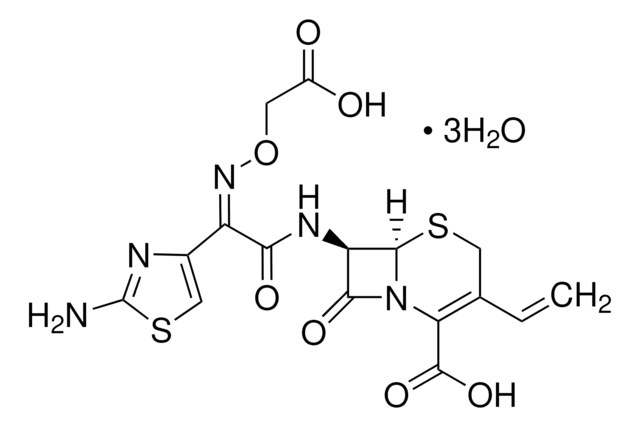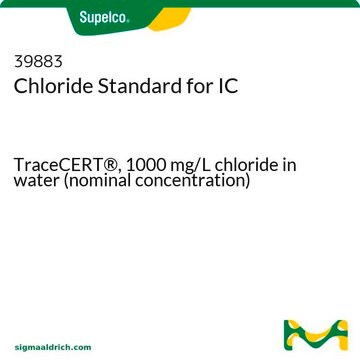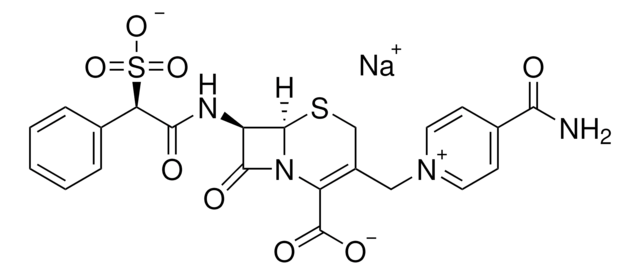18588
Cefixime trihydrate
suitable for microbiology, ≥98.0% (HPLC)
About This Item
Produits recommandés
Qualité
for ion-selective electrodes
Niveau de qualité
Pureté
≥98.0% (HPLC)
Spectre d'activité de l'antibiotique
Gram-negative bacteria
Gram-positive bacteria
Application(s)
microbiology
Mode d’action
cell wall synthesis | interferes
Chaîne SMILES
O.O.O.Nc1nc(cs1)C(=N\OCC(O)=O)\C(=O)N[C@H]2[C@H]3SCC(C=C)=C(N3C2=O)C(O)=O
InChI
1S/C16H15N5O7S2.3H2O/c1-2-6-4-29-14-10(13(25)21(14)11(6)15(26)27)19-12(24)9(20-28-3-8(22)23)7-5-30-16(17)18-7;;;/h2,5,10,14H,1,3-4H2,(H2,17,18)(H,19,24)(H,22,23)(H,26,27);3*1H2/b20-9-;;;/t10-,14-;;;/m1.../s1
Clé InChI
IPYWNMVPZOAFOQ-NABDTECSSA-N
Catégories apparentées
Application
- Physicochemical parameters and modes of interaction associated with the micelle formation of a mixture of tetradecyltrimethylammonium bromide and cefixime trihydrate: effects of hydrotropes and temperature.: This research delves into the physicochemical behaviors of cefixime trihydrate when mixed with tetradecyltrimethylammonium bromide, focusing on micelle formation and the influence of various hydrotropes and temperature changes on their interaction (Hossain M et al., 2023).
- Development, validation and greenness assessment of a new electro-driven separation method for simultaneous analysis of cefixime trihydrate and linezolid in their fixed dose combination.: This study introduces and validates a novel eco-friendly electro-driven method for analyzing cefixime trihydrate in combination with linezolid, emphasizing its application in fixed-dose pharmaceutical formulations (Habeeb MR et al., 2023).
- Bioremediation of multifarious pollutants using laccase immobilized on magnetized and carbonyldiimidazole-functionalized cellulose nanofibers.: Investigates the efficacy of laccase enzymes, immobilized on specialized cellulose nanofibers, in the bioremediation of pollutants, a process applicable to the environmental management of pharmaceutical agents including cefixime trihydrate (Sharma K et al., 2023).
Remarque sur l'analyse
Autres remarques
Produit(s) apparenté(s)
Mention d'avertissement
Danger
Mentions de danger
Conseils de prudence
Classification des risques
Resp. Sens. 1 - Skin Sens. 1
Code de la classe de stockage
11 - Combustible Solids
Classe de danger pour l'eau (WGK)
WGK 3
Point d'éclair (°F)
Not applicable
Point d'éclair (°C)
Not applicable
Équipement de protection individuelle
dust mask type N95 (US), Eyeshields, Faceshields, Gloves
Faites votre choix parmi les versions les plus récentes :
Certificats d'analyse (COA)
Vous ne trouvez pas la bonne version ?
Si vous avez besoin d'une version particulière, vous pouvez rechercher un certificat spécifique par le numéro de lot.
Déjà en possession de ce produit ?
Retrouvez la documentation relative aux produits que vous avez récemment achetés dans la Bibliothèque de documents.
Les clients ont également consulté
Notre équipe de scientifiques dispose d'une expérience dans tous les secteurs de la recherche, notamment en sciences de la vie, science des matériaux, synthèse chimique, chromatographie, analyse et dans de nombreux autres domaines..
Contacter notre Service technique














